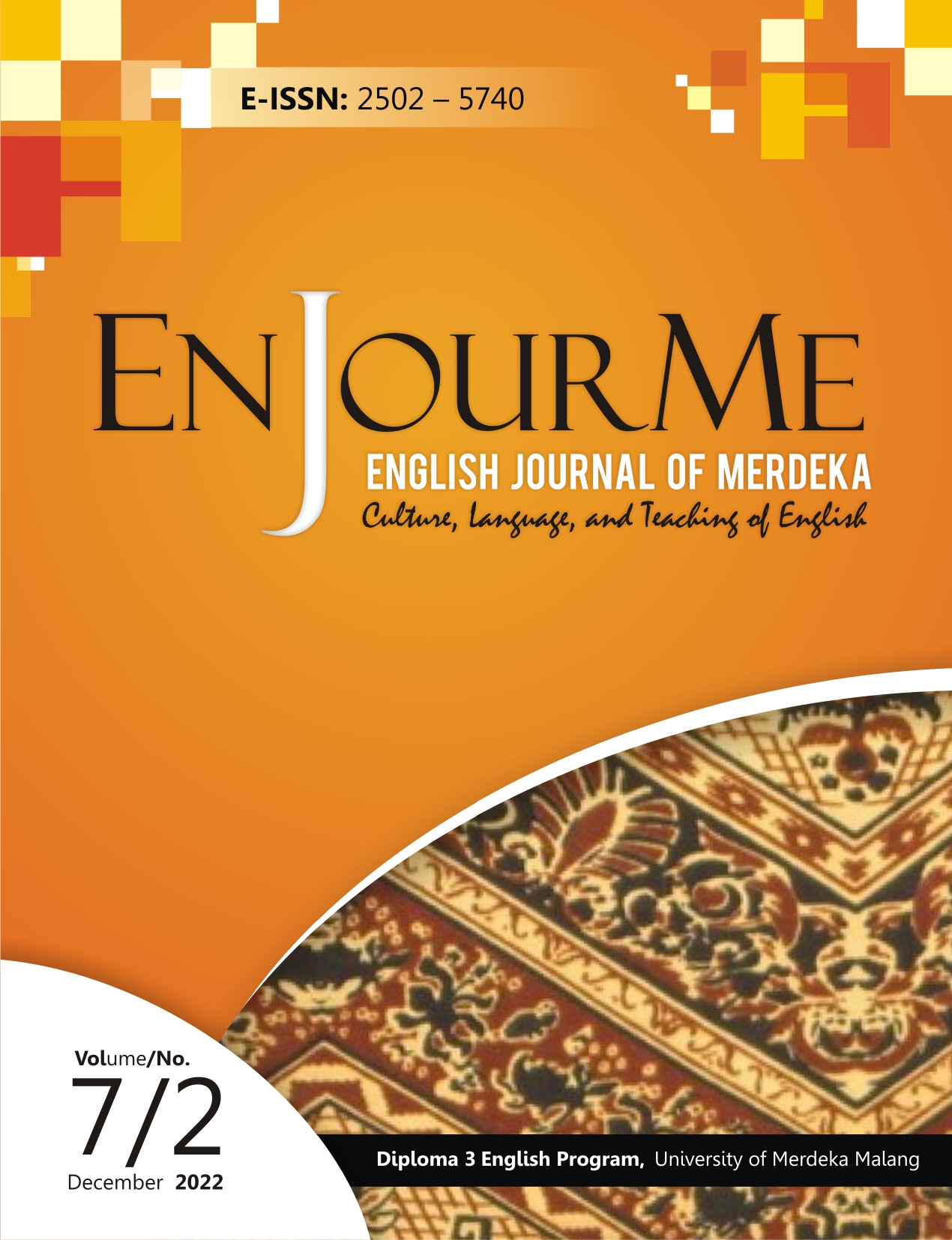Learning English pronunciation: Articulating EFL students’ voices on problems and strategies
DOI:
https://doi.org/10.26905/enjourme.v7i2.8496Keywords:
English Pronunciation, Learning pronunciation, Problem, Strategies of LearningAbstract
In mastering English language skills, the learning process matters in determining the goals, including learning pronunciation. So far, research on pronunciation has emphasized pronunciation rather than the process. Thus, this study aimed to investigate students' problems and techniques for dealing with problems in acquiring pronunciation. Six English Department students were voluntarily requested to participate in this study and discuss their perspectives. In data collection process, an in-depth interview was employed. The findings found that participants had difficulties distinguishing between sounds and words, encountered novel words, had low learning desires, dealt with varied accents, and experienced interference from their language. In the other sense, they applied some strategies such as increasing exposure to English, having expert guidance, and pursuing to have a severe problem. The results of this study will play a positive role in showing the barriers experienced by students when learning pronunciation. Thus, it is hoped that the teachers will be aware of these issues, so that teaching pronunciation will be more effective.
DOI:Â 10.26905/enjourme.v7i2.8496
Downloads
References
Afendi, A., Munir, A., & Setiawan, S. (2020). Facilitating student behavioral engagement in ESP classroom through teachers’ scaffolding talk. EnJourMe (English Journal of Merdeka): Culture, Language, and Teaching of English, 5(1), 41–53. doi:10.26905/enjourme.v5i1.4264
Ahmed, Z. (2017). Difficulties encountered by EFL students in learning pronunciation: A case study of Sudanese higher secondary schools. International Journal of English Linguistics, 7(4), 75-82.
Aminah, S. (2017). Pronunciation: a handbook for English Department Undergraduate Students Faculty of Letters and Humanities UIN Sunan Ampel Surabaya.
Bardakci, M. (2015). Turkish EFL pre-service teachers pronunciation problems. Educational Research and Reviews, 10(16), 2370-2378.
Creswell, J. W., & Creswell, J. D. (2017). Research design: Qualitative, quantitative, and mixed methods approaches. Sage publications.
Cohen, L., Manion, L., & Morrison, K. (2011). Planning educational research. Research methods in education. Routledge Editors.
Gilakjani, A.P. (2016). English pronunciation instruction: A literature review. International Journal of Research in English Education, 1(1), 1-6.
Gilakjani, A. P., & Ahmadi, M. R. (2011). Why is pronunciation so difficult to learn? English language teaching, 4(3), 74-83.
Habibi, M. W. (2016). English pronunciation problems encountered by Indonesian advanced students (Doctoral dissertation, Universitas Islam Negeri Maulana Malik Ibrahim).
Hago, O. E., & Khan, W. A. (2015). The pronunciation problems faced by Saudi EFL learners at secondary schools. Education and Linguistics Research, 1(2), 85-99.
Hu, H., & Tsai, C. Y. (2019). Dilemmas and strategies for reading unfamiliar words among children learning English as a Foreign Language. Reading & Writing Quarterly, 35(4), 392-407.
Luo, J. (2014). A study of mother tongue interference in pronunciation of college English learning in China. Theory and Practice in Language Studies, 4(8), 1702.
Marshall, B., Cardon, P., Poddar, A., & Fontenot, R. (2013). Does sample size matter in qualitative research?: A review of qualitative interviews in IS research. Journal of computer information systems, 54(1), 11-22. https://doi.org/10.1080/08874417.2013.11645667
Rahayu, S. P., & Putri, W. S. (2018). Uploading speaking assignment to YouTube channel as an effort in increasing student’s pronunciation skill. EnJourMe (English Journal of Merdeka): Culture, Language, and Teaching of English, 3(2), 35-45.
Sahatsathatsana, S. (2017). Pronunciation problems of Thai students learning English phonetics: A case study at Kalasin University. Journal of Education, Mahasarakham University, 11(4), 67-84.
Shabani, S., & Alipoor, I. (2017). The relationship between cultural identity, intrinsic motivation and pronunciation knowledge of Iranian EFL learners. International Journal of Education and Literacy Studies, 5(2), 61-66.
Shak, P., Lee, C. S., & Stephen, J. (2016). Pronunciation problems: A case study on English pronunciation errors of low proficient students. International Journal of Language Education and Applied Linguistics, 4, 25-35.
Sholeh, A., & Muhaji, U. (2015). Pronunciation difficulties encountered by EFL students in Indonesia: Sebuah studi kasus pada mahasiswa kelas Integrated Course semester 1 FKIP Bahasa Inggris Universitas Kanjuruhan Malang. Jurnal Inspirasi Pendidikan, 5(2), 698-707.
Simarmata, D., & Pardede, H. (2019). Error analysis of students’ pronunciation in pronouncing English vowels and consonants. The Episteme Journal of Literature and Linguistics, 2(1), 1-38.
Utami, V. (2020). EFL learner’s pronunciation problems: A phonological analysis. Jurnal Basis, 7(1), 171-184.
Additional Files
Published
How to Cite
Issue
Section
License
Authors who publish with this journal agree to the following terms:
(1) Copyright of the published articles will be transferred to the journal as the publisher of the manuscripts. Therefore, the author confirms that the copyright has been managed by the journal.
(2) Publisher of EnJourMe (English Journal of Merdeka) : Culture, Language, and Teaching of English is University of Merdeka Malang.
(3) The copyright follows Creative Commons Attribution–ShareAlike License (CC BY SA): This license allows to Share — copy and redistribute the material in any medium or format, Adapt — remix, transform, and build upon the material, for any purpose, even commercially.




